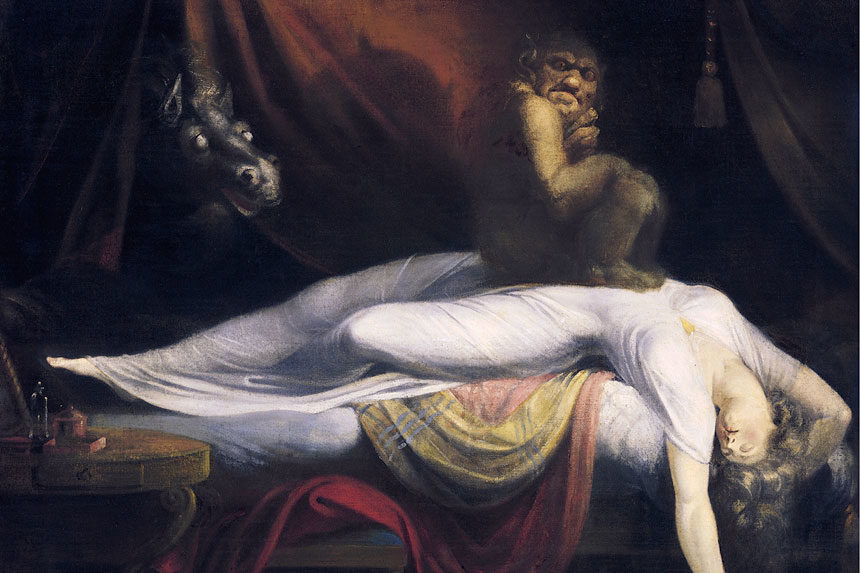Managing editor and logophile Andy Hollandbeck reveals the sometimes surprising roots of common English words and phrases. Remember: Etymology tells us where a word comes from, but not what it means today.
For as long as human beings have had dreams, we’ve also had nightmares. While modern science points to all manner of psychological sources of these frightening dreams, the people of old had other ideas about what caused them.
Long ago, strange things would sometimes happen during and around bedtime that couldn’t be explained. Sometimes people woke up gasping for air, whether upon waking from a frightening dream, or because of what we know today as sleep apnea, or even from an asthma attack. And then there is sleep paralysis, a condition occurring right before sleep or just upon waking in which a person can see and hear but cannot move or speak; some sleep paralysis sufferers have expressed that a feeling of suffocation comes along with it.
People found no ready explanation of these maladies, so they attributed them to the supernatural: A demon or goblin, they believed, sat on their chest while they were sleeping in order to suffocate them. In Old English, these supernatural ne’er-do-wells were called maere, which became mare and which etymologically has nothing to do with either horses or lunar geology. Mare that visited at night, when one was asleep, came to be called nightmares.
The word for this type of demonic nightmare dates back to around 1300. By the mid-1500s, the focus of the had word shifted from the demon to the feeling of suffocation itself. So if, say, Ben Franklin ever complained of nightmares, he wouldn’t have been talking about his dreams but about a difficulty breathing. Not until the early to mid-19th century would the connection between nightmare and scary dreams surface.
One unexpected usage note about nightmare: Until the 20th century, the word was most commonly used with the definite article. One didn’t have “a nightmare” but “the nightmare” — similar to how one might get the vapors or suffer from the mumps.
English-speakers weren’t the only ones beset by such demons. As far back as the 5th century A.D., St. Augustine was attributing this and worse to incubi (the plural of incubus). An incubus was a demon in a male form; later, based on the same etymological structure, the feminine form succubus was given a name.
If you were visited in the night by an incubus or a succubus and all you had was a bad dream or a sense of suffocation, then you got off easy. These demons wouldn’t just sit on their victims, they would lie with them — in the sexual sense — impregnating women and becoming pregnant by men and ultimately giving birth to witches and other demons.
We find incubus used in English writing around the beginning of the 13th century, and succubus in the late 14th century.
Those words incubus and succubus come from the Latin cubare “to lie down” with a prefix appended. In- means “on, upon,” and suc- is an assimilated form of sub-, meaning “under,” giving us, in Late Latin, incubare “to lie upon” and succubare “to lie under.” That the male-form incubus lay upon a victim and the female succubus lay under a victim probably tells us more about the Church’s views on sex than about the inclinations of infernal beasts.
Featured image: Henry Fuseli’s The Nightmare, 1781, public domain
Become a Saturday Evening Post member and enjoy unlimited access. Subscribe now




Comments
I have noticed more than a few times you have managed to sneak things of a sexual nature into your column, and do not approve. Not one bit. And Bob McGowan always there encouraging you with his comments. I can’t believe what he said in the second paragraph. Awful! On top of that he put comments on Gay Haubner’s new Halloween feature. I don’t approve of her either, but this time though it was your comment king. I do remember his dressing up for work as rock star one year, and a Chippendales dancer the next. Terrible. He and those women all should have been fired. That man is something else, but so are you. You should be ashamed of yourselves. What is going on at The Saturday Evening Post? Benjamin Franklin would put a stop to this indecency.
Great feature, Andy; especially the last 3 paragraphs. I think Ben Franklin would agree, too! The closest I’ve ever run into hearing something in this mode was in a collection call for Robinson’s in 1991. It was to an older lady who was 60 days past due on her fur coat payment. (It was not yet the taboo garment it is today, unfortunately).
It was a few grand, and I was trying to make a payment arrangement with her. Imagine my shock when she said to me “Young man, I feel like I’ve just been attacked by the uncircumcised infidels!” My eyes pin wheeled out for a few seconds, but I got back on track and a suitable payment arrangement was made.
On an related, unrelated note I received 3 Ben Franklin’s one time in the enclosed envelope I sent my customers. I called her advising I’d received the payment, but never, ever to mail CASH again. Only if paying in the department store itself, otherwise a check or money order if mailing. I took the cash with her account number to the store floor to pay/credit it, got the receipt and mailed it for her records. I made sure my boss saw the cash before, and the receipt afterwards. It made her day too!